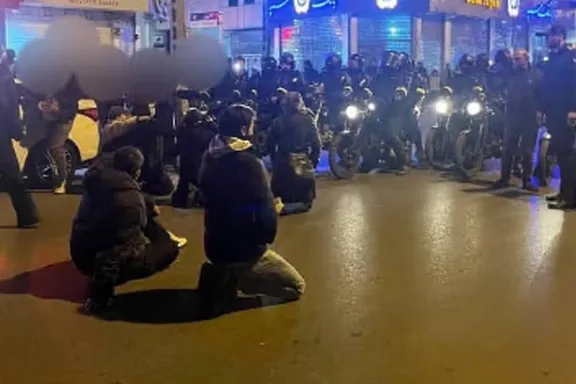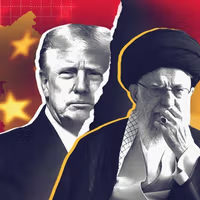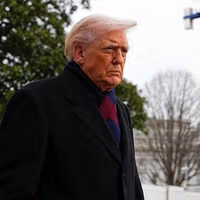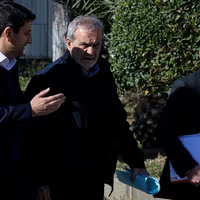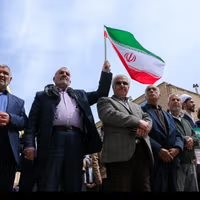IAEA Says Iran 'Very Close' To Weapons Grade Uranium
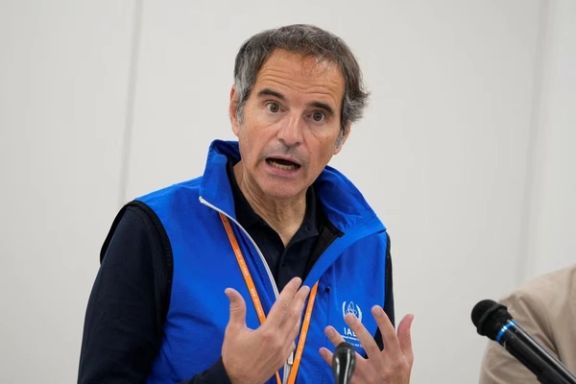
Rafael Grossi, the head of the International Atomic Energy Agency (IAEA), has said Iran is "very close to weapons grade" uranium as it continues rapid enrichment.

Rafael Grossi, the head of the International Atomic Energy Agency (IAEA), has said Iran is "very close to weapons grade" uranium as it continues rapid enrichment.
Grossi emphasized the imperative for Tehran to adhere to the nuclear proliferation treaty, telling The National newspaper, “Iran is the only non-nuclear weapon state which is enriching uranium at this very, very high level".
Trying to calm fears, he added, “I'm not saying they have a nuclear weapon, I'm saying this is sensitive. And when you're doing that … you abide by the rules".
The latest IAEA report disclosed that Iran has escalated its production of near weapons-grade uranium, reversing a slowdown initiated in mid-2023. Grossi linked Iran's intensified pursuit of high-grade uranium to escalating tensions in the Middle East, fueled by the Gaza conflict and the Iran-backed Houthi militia's attacks in Yemen, creating a shipping and security crisis in the Red Sea.
He said, “A snapshot shows a program which is galloping ahead, moving ahead with ambitious goals. We have nothing against that. But we say the visibility of the international inspectorate, the IAEA, must be commensurate with those activities.”
Western powers allege that Tehran's objective is to acquire nuclear weapons for threatening its adversaries, but the Islamic Republic claims its program is for civilian use.
Grossi argued that whether Iran's nuclear program is intended for civilian use or not, it is failing to fulfill its obligations under the nuclear non-proliferation treaty.
France, Germany, and Britain, signatories to the JCPOA, have also expressed concern, issuing a statement in December about Iran revoking authorization for inspectors critical of its nuclear dossier. Iran confirmed the activities of 127 inspectors but barred "three or four biased European inspectors" from continuing their activities at Iranian sites, as announced by the head of the Atomic Energy Organization of Iran on October 4.

Iran's foreign minister has rejected accusations of supporting Houthi rebels in Yemen, responsible for disrupting global trade through attacks on commercial vessels.
In an interview with CNBC at the World Economic Forum in Davos, Hossein Amir-Abdollahian claimed that people from Yemen and other regional countries defending the Palestinians are acting independently in spite of Iran having backed the group militarily and financially for years.
“The people of Yemen and other countries in the region who defend the Palestinian people are acting according to their own experience and through their own interests, and they are not receiving any orders or instructions from us,” he said, though the order to blockade Israel came publicly and directly from Iran's Supreme Leader.
It followed Israel's relentless retaliatory attacks on Gaza in response to the October 7 massacres in which 1,200 mostly civilians were murdered by Iran-backed Hamas and over 250 more taken hostage.
The Houthi militia initiated dozens of drone and missile attacks on Israeli territory and shipping in the Red Sea since November. On Monday, the Houthis launched an anti-ship ballistic missile at a US-owned commercial vessel, as reported by the US Central Command. The Red Sea accounts for 12% of global shipping.
In the ongoing conflict, Iran supports Hamas in its confrontation with Israel and continues to supply weapons to the Lebanese militant group Hezbollah which has targeted Israel's north in support of Hamas. Responding to the Houthi attacks, the US and its allies have initiated strikes against Houthi targets in Yemen.
Amir-Abdollahian also cautioned the US against “tying their destiny” to Prime Minister Benjamin Netanyahu's fate, asserting that Washington's full support for Israel is a root cause of insecurity in the region.
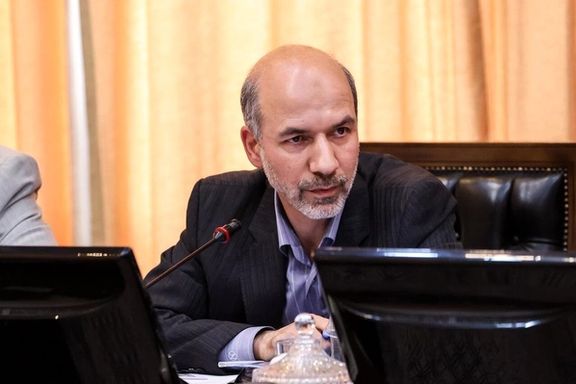
Iran's Energy Minister Ali Akbar Mehrabian has issued a warning about the impending challenges the country faces this summer due to electricity shortages.
Addressing the media regarding the upcoming "extraordinarily challenging summer," Mehrabian claimed “the successful management of significant imbalances” in the power industry over the past two years by utilizing mostly untapped capacities. Despite these efforts, he emphasized the need for “more stringent measures to address the persistent imbalances.”
For several consecutive years, Iran has struggled to meet its annual electricity growth plan, falling behind as a result of rapidly increasing consumption driven by remarkably low prices. The government, which oversees the energy sector, allocates an annual subsidy of up to $60 billion to individuals and businesses.
As summer approaches, the peak demand season due to the need for high energy air conditioning systems, Iran is grappling with a substantial electricity deficit, leading to widespread and prolonged power outages across the nation. To meet the escalating domestic demand, the country requires an annual electricity generation growth of at least 5 to 7 percent.
The primary contributors to the power shortage are the insufficient investments in expanding power generation capacity and natural gas production. The gas sector alone necessitates $40 billion to enhance production and keep pace with demand. Hydro-power plants, facing a significant decline in power generation due to severe droughts, play a significant role in the overall decrease in power generation.
Despite experiencing an average of 300 sunny days annually, Iran's renewable energy sector, particularly wind and solar power, remains underdeveloped, constituting only 0.5% of the total domestically generated power.
Thermal power plants, dominating with a share exceeding 90% in the country's electricity generation, resort to burning billions of liters of polluting mazut and diesel during cold months due to a massive gas deficit. The practice results in severe air pollution, emphasizing the urgent need for sustainable energy solutions.

In less than one day, Iran’s IRGC has launched missile strikes on three neighboring countries, claiming ‘revenge’ for civilians and troops killed in the past few weeks.
Having hit several locations in Syria and Iraqi Kurdistan Monday, IRGC missiles and drones targeted Pakistan Tuesday, in an operation that Iran said was against the Sunni militant group Jaish al-Adl.
Pakistan called the attack “illegal” and “completely unacceptable”, claiming it had killed two children and warning of “serious consequences”.
“Such unilateral acts are not in conformity with good neighborly relations and can seriously undermine bilateral trust and confidence,” Pakistan’s foreign ministry said in a statement shortly after the attacks. “The responsibility for the consequences of this action will lie squarely with Iran.”
Iran and Pakistan have difficult but functioning relations. Clashes in border areas occur from time to time, mainly involving groups such as Jaish al-Adl, which has claimed responsibility for attacks on, and killing of, several Iranian border patrol.
On Tuesday, hours before the airstrikes, Iran and Pakistan had a joint military exercise in the Persian Gulf, according to Iran’s official news agency IRNA, and Iran’s foreign minister met Pakistan’s caretaker prime minister on the sidelines of the World Economic Forum in Davos.
Some experts say it’s likely that Iranian officials had informed their Pakistani counterparts about the attacks, even though the reaction from Islamabad may suggest otherwise. "An ‘unprovoked’, surprise attack on the territory of a nuclear power seems to be one step too far for a regime that has proven time and again to bark more than it bites," an observer noted.
Iran’s muscle-flexing –using ballistic missiles on targets, some of which were well over 1,200 km away– comes amid US and UK airstrikes on Iran-backed Houthis in Yemen, who, nonetheless, continue to target vessels in the Red Sea as a show of support for Palestinians in Gaza.
On the face of it, the IRGC attacks have no connection to the Israeli onslaught in Gaza, and are merely retaliatory operations against those who the regime in Tehran says have attacked Iranians and Iranian interests. Set against the backdrop of ‘contained’ conflicts from Yemen to Lebanon, however, it is hard not to see these attacks as part of a regional power struggle between Iran and Israel –and therefore connected to what is happening in Gaza at the moment.
The Iranian regime funds, trains and equips various armed groups across the Middle East, whose shared objective is to push back "the Americans from the region" –and "liberate Palestine from the Zionists."
In the US, many blame the Biden administration for this reinvigoration of the embattled, Iran-led “Axis of Resistance”. The critics say Biden, in his eagerness to find a nuclear agreement with Iran, “appeased” the Ayatollah and lost all deterrence in relation to the regime and its regional allies.
“From day one, the Biden Administration met Iranian aggression with accommodation and squandered the credibility of American deterrence,” US Senate Republican Leader Mitch McConnell posted on X Tuesday. “It’s time for POTUS to explain how exactly he intends to compel Iran and its proxies to change their behavior.”
The US military targeted more Houthi sites in Yemen Tuesday, in the third such assault on the Iranian-backed group in recent days. And the Biden administration is expected to announce that it will redesignate the Houthis as "global terrorists" Wednesday, almost three years after it delisted the group to facilitate humanitarian aid to Yemen - or to appease Iran, depending on whose view one believes.
Too little too late, many Biden critics say.
“In February 2021… the President delisted Yemen’s Houthi rebels as a foreign terrorist organization,” Congressman Dan Meuser posted on X Tuesday. “Now, because of Biden’s appeasement, the Houthis are stronger than ever and attacking American commercial and military ships at Iran’s direction. As former Defense Secretary Robert Gates said of Joe Biden, “he has been wrong on nearly every major foreign policy and national security issue over the past four decades.”

In spite of Iranian denials, the Australian government admits it is “concerned” by Iran’s ongoing espionage activities.
A spokeswoman for Australia’s Home Affairs Department told Iran International: “Last year, the Australian Government made it clear that it is concerned by reports of harassment and monitoring of people in Australia by foreign governments, including Iran.”
Earlier this month, The Australian Financial Review published an interview with the Islamic Republic’s Ambassador to Australia, Ahmad Sadeghi, during which he rejected claims by Australia's Home Affairs Minister Clare O’Neil that the Iranian government had been spying on dissidents in Australia, insisting they were safe from harm or kidnapping.
However, last year, O’Neil revealed that Australia had disrupted the activities of suspected Iranian intelligence who had conducted surveillance of the home of an Iranian-Australian dissident, as well as their family, part of a wider global crackdown in the wake of the 2022 uprising.
"I just want to step back and say this again: we have here someone living in our country who is being followed, watched, photographing their home invaded by people at the direction of a foreign power. This is happening in Australia, and this is something ASIO was onto like a shot," O'Neil said last year.
And the threat does not seem to have disappeared. “Espionage and foreign interference represent a serious threat to Australia’s security and the integrity of our national institutions,” the Department of Home Affairs told Iran International this week.
While stressing it is not only Iran which represents a threat, other nations such as China are equally troubling, the spokeswoman added: “It is unacceptable for any foreign government to target members of our community in ways that prevent individuals exercising their fundamental rights and freedoms in Australia. We will continue to take strong action to deter foreign interference, protect the Australian community and uphold our laws and values.”
Tina Kordrostami, an Australian-Iranian woman, spoke out about her own ordeal after experiencing harassment on Australian soil by a suspected regime agent in December 2022 amidst the protests.
Not only was she followed, but a strange man got into her car while stationary, issuing threats.
Kordrostami's father also started receiving threats against her life, and she found herself under surveillance, with unidentified men taking photographs of her during rallies and public events.
After she made the revelations to Iran International, several other Australian-Iranians since broke their silence, highlighting how the Iranian regime monitors their activities in Australia. This has raised concerns among the community, who are now demanding protection from the Australian government.
While Australia has been among the nations to sanction Iran in the wake of both the brutal crackdown of protesters since 2022, and Iran’s arming Russia in its invasion of Ukraine, it has not stepped up to designate Iran’s Revolutionary Guard Corps which has had foreign plots foiled in countries from the UK to Cyprus and Azerbaijan.
The Australian Shadow Assistant Foreign Minister expressed disappointment in November that Australia has not listed Iran's Islamic Revolutionary Guard Corps (IRGC) as a terrorist organization.
"It's incredibly disappointing that governments like Australia have not yet listed Iran's IRGC as a terrorist organization up to this point," she told Iran International, not least for its backing of regional proxies such as Hamas in Gaza and Hezbollah in Lebanon and its destabilizing effects now felt across the Middle East and beyond.

Multiple foreign diplomatic missions in Iraq have condemned Iran's assault on Erbil on Monday.
The US Ambassador to Iraq, Alina L. Romanowski, said the missile strikes on the Iraqi Kurdistan Region were “reckless and indiscriminate attacks on civilians" which violated Iraq's sovereignty.
The UK's Ambassador to Baghdad, Stephen Hitchen, also condemned the aggression against Erbil, denouncing it as a breach of Iraq's sovereignty and territorial integrity. Hitchen extended condolences to the victims' families and expressed support for the Kurdistan Regional Government.
His sentiments were echoed by UK Foreign Secretary David Cameron who issued a statement on X condemning the Iranian attacks as "unprovoked and unjustified actions," constituting a violation of Iraq's territorial integrity. Germany, France, and the Netherlands also condemned the assault.
Canada's Ambassador to Iraq, Kathy Bunka, and Japan's envoy to the country, Futoshi Matsumoto, joined in condemning the attack. Matsumoto stressed the importance of respecting Iraqi sovereignty and peace by all parties, while Bunka conveyed condolences to the victims' families and the injured.
The incident occurred late on Monday when Iran's Islamic Revolutionary Guard Corps (IRGC) launched 10 ballistic missiles, purportedly targeting the "spy headquarters" of anti-Iran groups in Erbil. The attack resulted in a minimum of four fatalities and 17 injuries.
Iraq's foreign ministry also denounced the Iranian aggression against Erbil, taking diplomatic action by summoning the Iranian charge d'affaires in Baghdad, delivering a protest note condemning the attack. Additionally, Iraq recalled its ambassador to Tehran for consultations in response to the recent Iranian attacks on Erbil.
Nasser Kanaani, the spokesperson for the Iranian foreign ministry, asserted that the attacks aimed “at defending the country's sovereignty and security, combating terrorism.”
